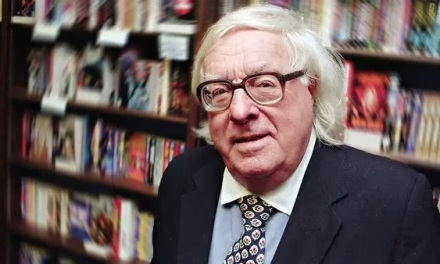
Ennio Morricone, the Italian composer whose quirky and symphonic scores backed everything from spaghetti westerns to romance, horror and sci-fi films, has died aged 91 in Rome.
He first came to international attention with Sergio Leone’s films beginning with A Fistful of Dollars, followed by the iconic The Good, The Bad, and the Ugly. The theme’s wailing ocarina, electric guitar, gunfire, whistling, and wolf-like yodeling are perfect for evoking a fantasy Old West.
Born in Rome in 1928, Morricone took up the trumpet and wrote his first composition aged six. He studied classical music and after graduating began writing scores for theatre and radio. He was hired as an arranger by the label RCA in Italy and also began writing for pop artists; his songs became hits for Paul Anka, Françoise Hardy and Demis Roussos, and he later collaborated with Pet Shop Boys. He also made boundary-pushing avant garde work with Gruppo di Improvvisazione di Nuova Consonanza, a collective of experimental, improvisational composers.
But it was his film scores that brought him the most fame. He began in the mid-1950’s as a ghostwriter on films credited to others, and orchestrated other composers’ work for directors including Michelangelo Antonioni, Vittorio de Sica and Dino Risi. He graduated to composing his own scores, including films directed by Sergio Leone, John Carpenter, Terrence Malick, Brian de Palma, and Quentin Tarantino.

His filmography includes over 400 films, including all Sergio Leone’s films since A Fistful of Dollars, all Giuseppe Tornatore’s films since Cinema Paradiso, The Battle of Algiers, Dario Argento’s Animal Trilogy, 1900, Exorcist II, Days of Heaven, several major films in French cinema, in particular the comedy trilogy La Cage aux Folles I, II, III and Le Professionnel, as well as The Thing, Once Upon A Time In America, The Mission, The Untouchables, Mission to Mars, Bugsy, Disclosure, In the Line of Fire, Bulworth, Ripley’s Game and The Hateful Eight.
Sergio Leone said “The music is indispensable, because my films could practically be silent movies, the dialogue counts for relatively little, and so the music underlines actions and feelings more than the dialogue,” Leone has said. Morricone has said his own best work was for Leone’s 1984 film Once Upon a Time in America.
The master wrote a final statement, that said in part:
“I, Ennio Morricone, have died.
I’m announcing my death to all my friends that have always been close to me and to those who I haven’t seen for a while. I salute them with great affection … I hope they will understand how much I’ve loved them.”
Morricone’s best-known compositions include The Ecstasy of Gold, Se Telefonando, Man with a Harmonica, Here’s to You, the UK No. 2 single Chi Mai, Gabriel’s Oboe and E Più Ti Penso, as well as the theme Cinema Paradiso composed with his son Andrea. In 1971, he received a “Targa d’Oro” for worldwide sales of 22 million, and by 2016 Morricone had sold over 70 million records worldwide. In 2007, he received the Academy Honorary Award “for his magnificent and multifaceted contributions to the art of film music.” He was nominated for a further six Oscars. In 2016, Morricone received his first competitive Academy Award for his score to Quentin Tarantino’s film The Hateful Eight, at the time becoming the oldest person ever to win a competitive Oscar.

His other achievements include three Grammy Awards and 6 nominations, three Golden Globes, six BAFTAs, ten David di Donatello, eleven Nastro d’Argento, two European Film Awards, the Golden Lion Honorary Award, and the Polar Music Prize in 2010. He frequently engaged concert tours with highlights from his many scores, and was still conducting orchestras in 2019.
His contributions to world culture are widely influential, including in science fiction. For example his iconic theme from The Good the Bad and the Ugly is reflected in the theme to The Mandalorian. His work has gained a place in pops concerts, and he continued to compose new scores, including the oscar-winning Hateful Eight and an Italian TV series this year. A unique blend of Hollywood and Rome, he had a distinctive style that was frequently imitated but never surpassed. When I met him he was as others described him, a quiet, reserved person that you’d never imagine could be so grand and melodramatic. It’s sad that he’s gone yet his work will be with us for generations.
British film director Edgar Wright also paid tribute, saying: “He could make an average movie into a must see, a good movie into art, and a great movie into legend. He hasn’t been off my stereo my entire life. What a legacy of work he leaves behind. RIP.”
-30-
![]()
David Raiklen wrote, directed and scored his first film at age 9. He began studying keyboard and composing at age 5. He attended, then taught at UCLA, USC and CalArts. Among his teachers are John Williams and Mel Powel.
He has worked for Fox, Disney and Sprint. David has received numerous awards for his work, including the 2004 American Music Center Award. Dr. Raiklen has composed music and sound design for theater (Death and the Maiden), dance (Russian Ballet), television (Sing Me a Story), cell phone (Spacey Movie), museums (Museum of Tolerance), concert (Violin Sonata ), and film (Appalachian Trail).
His compositions have been performed at the Hollywood Bowl and the first Disney Hall. David Raiken is also host of a successful radio program, Classical Fan Club.











